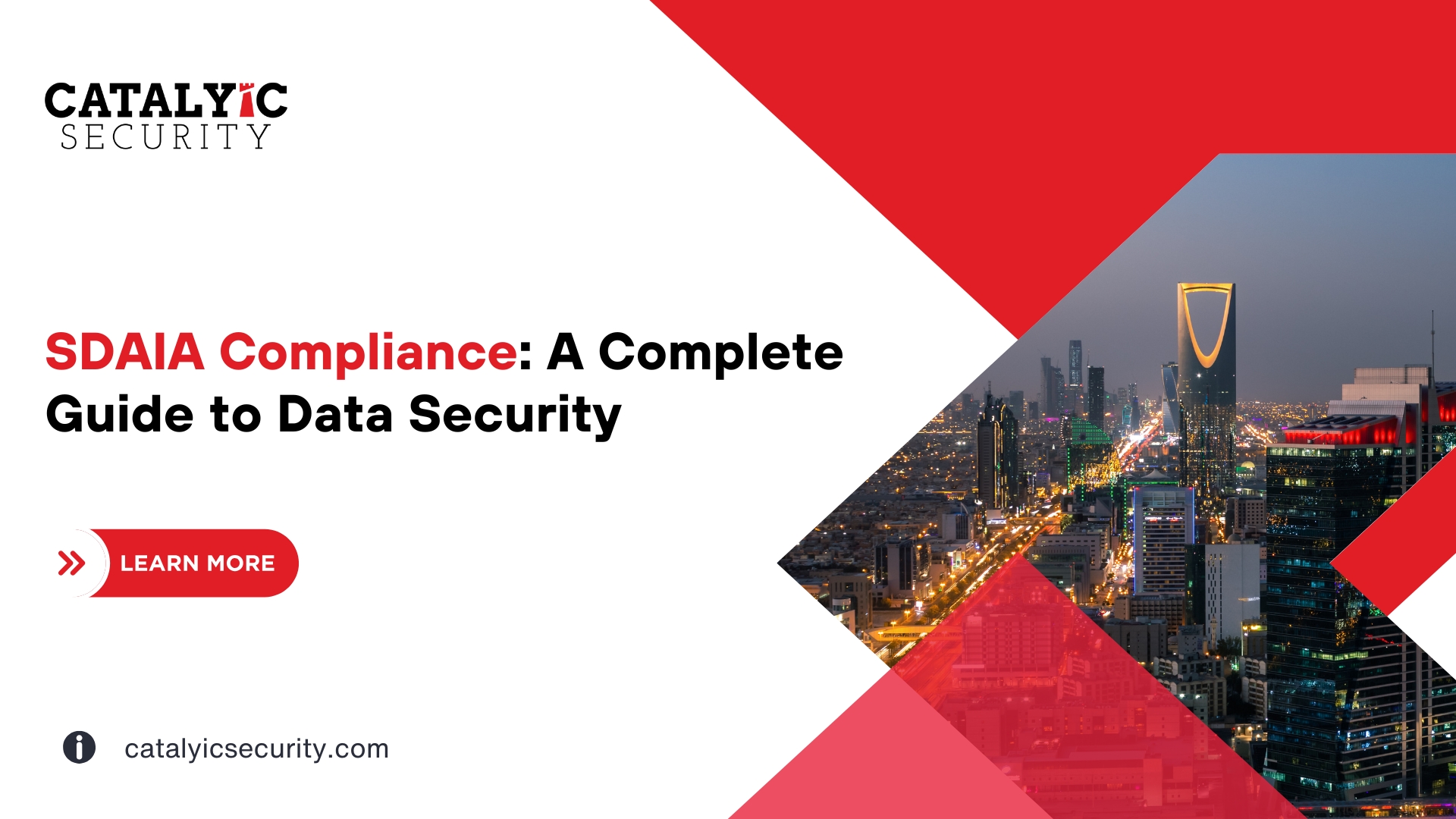In October 2024, the Saudi Data and Artificial Intelligence Authority (SDAIA) released updated guidelines under the Personal Data Protection Law (PDPL). These changes aim to strengthen data protection practices across sectors, especially for organizations handling personal and sensitive data within Saudi Arabia. For companies managing large amounts of data or transferring information internationally, complying with SDAIA’s latest standards is critical for regulatory adherence and building customer trust.
This guide explores SDAIA’s new compliance requirements, highlights best practices for meeting these standards, and shows how Catalyic Security can support your organization in achieving and maintaining compliance effectively.
Understanding SDAIA’s October 2024 Compliance Guidelines
Saudi Arabia’s digital transformation, driven by Vision 2030, has put data security and privacy at the forefront. SDAIA’s October 2024 updates focus on four main areas: data transfer safeguards, data controller registration, minimum data collection, and the appointment of Data Protection Officers (DPOs). Each area addresses specific vulnerabilities and requires transparent organizational processes.
1. Strengthened Data Transfer Safeguards
SDAIA now requires organizations transferring personal data outside Saudi Arabia to conduct comprehensive risk assessments. This applies particularly to organizations managing sensitive data or performing large-scale transfers. Risk assessments must consider the purpose, legal basis, protective measures, and potential impact of the transfer on individuals. These assessments help identify vulnerabilities and ensure that the data remains secure throughout its journey.
In addition to risk assessments, SDAIA advises using Standard Contractual Clauses (SCCs) or similar agreements to formalize data protection measures for cross-border transfers. By implementing these controls, organizations can show their commitment to safeguarding sensitive information from potential exposure or misuse.
2. Mandatory Data Controller Registration
SDAIA now mandates that public entities, organizations processing significant amounts of personal data, and those handling sensitive information must register with the National Data Governance Platform. This registration ensures transparency in data handling practices and helps individuals understand which organizations have access to their information.
Upon registering, organizations receive a five-year certificate, which must be publicly accessible. This step holds companies accountable for their data collection and processing practices. Registration also provides a layer of credibility, as only compliant organizations receive certification under SDAIA’s framework.
3. Enforcing the “Minimum Necessary” Principle
The new guidelines place a strong emphasis on collecting only the minimum amount of personal data needed to perform specific tasks. SDAIA’s “minimum necessary” principle reduces data exposure and ensures that organizations do not accumulate unnecessary information that could lead to breaches or misuse.
This principle requires data controllers to:
- Assess the relevance of each data point they collect.
- Limit data retention and securely delete data once it serves its purpose.
- Continuously review and minimize data storage to uphold compliance.
Adopting this principle benefits both compliance and operational efficiency. When organizations collect less data, they reduce storage and management costs while lowering the data exposure risk.
4. Data Protection Officer (DPO) Requirement
For organizations managing large volumes of personal or sensitive data, appointing a Data Protection Officer (DPO) is now mandatory. A DPO is crucial in enforcing compliance, conducting staff training, and responding to potential data incidents. The DPO is the main liaison between the organization and SDAIA, ensuring that all data processing activities align with SDAIA’s standards.
The DPO’s responsibilities include:
- Monitoring data processing practices within the organization.
- Overseeing data protection policies and training.
- Leading data incident response and mitigation efforts.
The presence of a knowledgeable DPO strengthens internal compliance and reassures customers and stakeholders of the company’s commitment to data security.
Personal Data Breach Response: SDAIA’s Three-Stage Guide
The SDAIA guidelines outline a structured, three-stage approach for responding to personal data breaches, ensuring that incidents are managed efficiently and with minimal impact on data subjects.
Stage 1: Notify SDAIA
Organizations must report any breach within 72 hours of discovery if it affects individuals’ rights or interests. This report should include:
- A description of the breach, including when and how it occurred.
- The types of data affected and the number of individuals involved.
- A summary of the remedial steps taken and future preventative measures.
Stage 2: Contain the Breach
SDAIA requires organizations to contain breaches as swiftly as possible to mitigate harm. This includes identifying affected data and taking steps to stop further exposure. If individuals face potential risks like identity theft or fraud, the organization must notify them promptly, using communication methods such as emails or text messages.
Stage 3: Document and Review
Finally, organizations should document every step taken during a breach response. This record-keeping process allows companies to review incidents, learn from them, and implement better preventative measures for the future. Accurate documentation also reinforces regulatory compliance and can be essential in demonstrating due diligence to SDAIA.
How Catalyic Security Helps Your Organization Achieve SDAIA Compliance
SDAIA compliance marks a critical step toward a more secure and transparent digital environment in Saudi Arabia. By adhering to these guidelines, organizations demonstrate their commitment to responsible data handling and regulatory accountability.
Catalyic Security offers comprehensive support to help organizations meet SDAIA compliance standards, combining expertise in cybersecurity and data management to streamline regulatory adherence. Our team performs in-depth risk assessments for data transfers, assisting in implementing Standard Contractual Clauses (SCCs) and ensuring data protection across borders.
We simplify the process of data controller registration on the National Data Governance Platform and provide tools to support the “minimum necessary” data principle, reducing both storage costs and security risks. In the event of a breach, our incident response services manage SDAIA-required notifications, containment actions, and documentation. In contrast, our DPO services offer guidance or training to ensure ongoing data protection and regulatory alignment. Through these tailored solutions, Catalyic Security enables your organization to achieve and maintain SDAIA compliance confidently.

